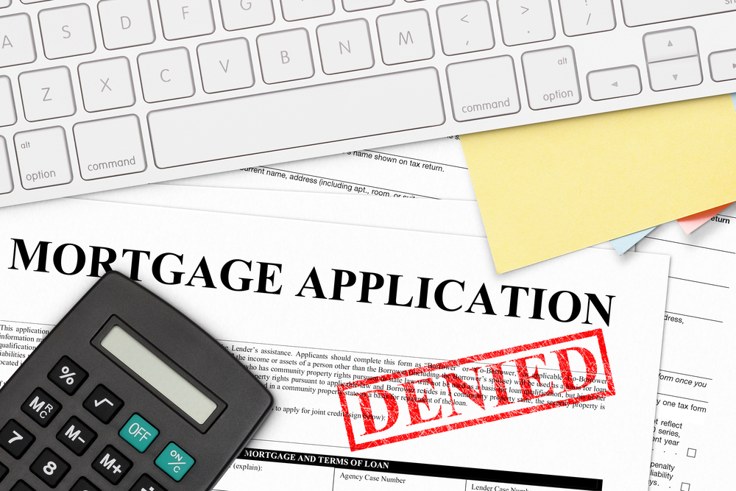Applying for a mortgage can be a daunting, but by following a few simple steps and understanding reasons for refusal, homebuyers can ensure they are in the best position to ensure they aren’t refused a mortgage from mortgage lenders.
Despite the fact the majority of mortgage applications are accepted – at Halifax, eight out of 10 mortgage applications are approved – there are several different reasons that your mortgage application may be refused. Read on to find out more about why your mortgage application may be refused.
These are 5 of the most common reasons for being refused a mortgage:
1. Poor credit history
Before mortgage lenders hand out any money, they will review the individuals credit history to find out whether or not to approve the application or deciding how much to lend. The most common reason for not accepting applications is due to a poor credit history.
If you have had problems repaying debt in the past, been given a County Court Judgement (CCJ), been registered bankrupt or entered into an Individual Voluntary Arrangement (IVA), it will show up on your credit report. Depending on the severity and your mortgage lender, they may decide to refuse your application. This is down to the fact that your lender will consider you more likely to miss a mortgage repayment, or be unable to repay on time, than other people.
Therefore, if you are looking to take out a mortgage, or remortgage your home, it is important to improve your credit score as best as you can.
2. Lack of credit history
Some people opt for cash-only transactions, to avoid getting into debt, while others have never had the need to enter a credit agreement, such as for a mobile phone or credit card.
You may think this is a good thing, as you don’t owe anyone any money, however, there is a major problem with this: you have no, or limited, credit history. This does not give mortgage lenders an idea of how well you can pay back money, which can be a problem. As a result, when borrowing money from any bank, there are specifically looking to see that you can appropriately manage credit and can pay it back on time.
One way to increase your credit card rating is to take out a credit card and spending a little on it regularly and paying off the debt in full each month. This will mean you can demonstrate your ability to handle credit and build-up your credit score.
RELATED: The Different Types of Mortgage in the UK, Explained

Photo credit: Rawpixel.com / Shutterstock
3. Low income
Affordability is assessed on various factors and, sometimes, potential borrowers have unrealistic expectations and apply for a larger loan size in comparison to their salary.
In order to understand more about your finances and figure out what you can afford, use a simple mortgage calculator, which shows you the total cost of the mortgage, including fees and interest. This ensures you are more ofay with your financial situation, and you can avoid having a mortgage application refused.
4. Insufficient information on the application form
Omitting pieces of information from your mortgage application can be detrimental and result in a refusal. Some applicants think that by leaving out personal, banking and employment information, it will improve their chances of being accepted for a mortgage. However, this is not the case because many applications are rejected due to this very reason.
Therefore, it is crucial to be open and upfront on your mortgage application. After all, a mortgage is the biggest financial obligation you will ever enter.
It is important that you ensure that you have the following documentation available when submitting a mortgage application:
- Utility bills
- Proof of benefits received
- P60 form from your employer
- Your last three months’ pay slips
- Passport or driving license (to prove your identity)
- Bank statements of your current account for the last three to six months
- Statement of two to three years’ accounts from an accountant if self-employed
- Tax return form SA302 if you have earnings from more than one source or are self-employed
- Self-employed people should look to provide information alongside their tax return, which supports what the SA302 says about their income, such as bank statements
This may differ depending on the mortgage lender, so make sure you check carefully before submitting an application.
You might also need to show your outgoings, including how much you’re borrowing on credit cards and other loans, as well as your household bills. This includes:
- Utility bills
- Council Tax
- Insurance policies
- General living costs (e.g. travel, childcare and entertainment etc.)

Photo credit: Pixel-Shot / Shutterstock
5. Employment
The amount you are eligible to borrow is based upon affordability criteria. Employment gaps can impact an application, as can short-term job roles, as it shows that you may not have a steady flow of income, and thus may be unable to afford to pay a loan back on time. Some mortgage lenders prefer borrowers to be in their current job role for more than six months, to show that they have stability and a steady income.
On the other hand, being refused a mortgage is highly likely if you have recently become self-employed, due to the fact that you don’t have much evidence of a steady income yet. As a result, lenders will question whether you will be able to pay back your mortgage on a newly self-employed income, as it depends on just how well you are doing money-wise.
If you have been refused a mortgage due to self-employment, is easy to reapply once you have some reliable and consistent evidence of your income from your self-employment or postpone your self-employment until you have secured your mortgage and started repaying it back easily. If you do not pay your mortgage in time and are struggling financially, you could be at risk of repossession.
6. Age
If you are looking to remortgage your home to raise some extra money from your home, you may find that some mortgage lenders are unwilling to let you due to age.
There are other ways to get extra cash for your retirement, rather than looking into remortgaging or opting into a equity release scheme.
RELATED: What are the Pitfalls of Equity Release?
Refused a mortgage? What now?
It is advisable to use a mortgage broker if you have had your mortgage application declined. Brokers know the market and each firm’s lending criteria, which means they will be able to tell you where you have gone wrong and which lender is right for your personal circumstances.
These are the different types of mortgage refusals:
- Mortgage declined despite agreement in principle
- Full mortgage application declined
- Mortgage declined by underwriter
- Mortgage application declined after valuation
- Mortgage application declined after exchange of contracts
- Mortgage offer expires before completion
Does being refused a loan affect your credit rating?
If you have been refused a mortgage and still need the credit you have applied for, you shouldn’t rush into applying for another one, as your credit application will appear on your credit record.
Although having a mortgage application declined doesn’t damage your credit score, it will show on your credit report that a mortgage lender conducted a search, but not what the result was.
If you decide to make another application to a different mortgage lender, they will see this – known as a ‘hard search’ – and may put them off lending to you. Numerous hard searches will affect your credit score. It makes lenders think there is a problem and you are being rejected by other lenders. The way to avoid this is to take your time before you apply for a mortgage. Find the lender most likely to accept your application, make sure your credit report is looking its best and use a mortgage broker.
Feature image credit: Doubletree Studio / Shutterstock




